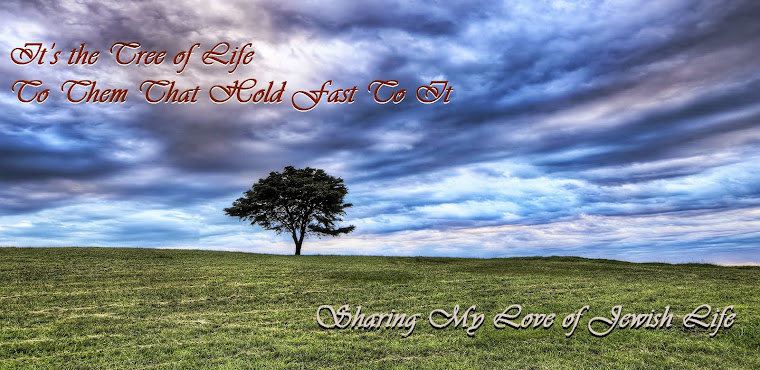We often speak about the hidden nature of Hashem. Once, before the fruit of the Tree of Knowledge of Good and Bad had its fruit eaten by Adam and Chava, humans were creatures with a full awareness of Divinity in the world. Once, before the Children of Israel sinned in their haste to connect to Hashem by making a golden calf to replace Moshe, the descendants of Avraham, Yitzchak, and Yaakov were blessed to be able to not only perceive Hashem, but to travel with a tangible connection to the Divine. Thus it is that in the world we live in today, we must each of us actively strive to see Hashem in the world and to recognize Hashem’s role in our daily lives.
Perhaps one of the greatest challenges that a majority of
humanity faces, or so it seems, is recognizing that we are creatures of body
AND spirit. We are challenged at seeing our own neshamos, our own souls, and
perhaps this is why so many people end up feeling like they need to find themselves.
This dilemma is not new to the human condition, although we often pontificate
that it has grown much worse in every generation. The challenge of seeing our
true selves is one with which even Moshe struggled.
Yes, yes, you might be saying. We all know that Moshe did not
want to be the leader of Klal Yisrael, that he told Hashem that he was the
wrong guy for the job, and that he excused himself because of his speech impediment.
This, of course, could be a psychologist’s field day explaining how a man
raised in a palace feels out of place leading people. (This would certainly be
perplexing if one took their image of Moshe from the old Ten Commandments movie
or the Prince of Egypt movie in which Moshe is raised as an equal to the upcoming
prince, Ramses.)
The idea of Moshe as a man who had trouble envisioning
himself as a potential leader or even as a messenger for Hashem, fits well with
the verse from Bamidbar 12:3: “The man Moshe was exceedingly humble, more than
any other person on the face of the earth.” Moshe rarely seems to assert
himself for himself, and this is one of the traits of his greatness. Yet the
statement of his humility is often questioned since he had to declare his
leadership, he did have to take charge, and these are actions one does not
generally associate with a humble person.
Jewish teachings answer the question of whether Moshe being
humble and being the leader of Klal Yisrael is a contradiction by noting wisely
that being humble does not mean stating that one is not good at things but
rather it means being aware of one’s gifts and talents and putting them to
proper use without a sense of arrogance. In Parshas Va’era, we see, perhaps, that
Moshe’s ability to become a man of exceeding humility was, possibly, because of
a bracha from Hashem.
Perek vav (6) concludes “Moshe appealed to the LORD, saying, ‘See, I am of
impeded speech; how then should Pharaoh heed me!’” (Shemos 6:30). This was Moshe’s
famous attempt at an out from the leadership role. Perek zayin (7), interestingly,
then begins with: “The LORD
replied to Moshe, ‘See, I place you in the role of God to Pharaoh, with your
brother Aaron as your prophet.’” (Shemos 7:1). Although the translation records both verses
as using the word “See,” Shemos 6:30 says hain, which translates better as “behold.”
Shemos 7:1, on the other hand, uses the actual word see… r’aih.
Commentaries on this verse infer that Hashem made it so that
Pharoah would see Moshe’s greatness, but perhaps Pharoah became aware of Moshe’s
greatness because Moshe became aware of Moshe’s greatness. Once Moshe was able
to see himself, to see his personal strengths as well as his natural
weaknesses, nobody, not even Pharoah, could make him feel little. Once he
understood what his role was, what his true place in the world was, Moshe was
able to go before Pharoah and demand that he let the people go, and he was also
able to withstand the retorts, the lies, and the changing of mind because he saw
that it had nothing to do with him and all to do with Hashem’s greater plan, as
he and Aaron were warned.
This idea also explains why there appears to be a repetition
from last week’s parsha in that Hashem sent Moshe to Pharoah already, and Moshe
was sent away and then derided by the very people he thought he had come to
save. Moshe before Perek zayin thought that he had to be someone different to
save klal Yisrael, and both the Egyptians and the Israelites saw through that.
After Hashem tells him to see, however, Moshe understands that his true self
was exactly what was needed to redeem Bnei Yisrael.
Seeing one’s true self is not easy; even Moshe Rabbeinu
needed a Divine bracha to do so properly. We are all hindered by the weight of the
guf, the physical selves, that contains the neshama, the soul. Our physical
selves thrive in a material world, a world that cannot deny human nature’s instinctive
desire for praise, conformity, and recognition by others.
That same material world, however, is the curtain that maintains
Hashem’s hiddenness, that keeps us in galus (exile). Perhaps the path to ending
that galus begins with learning from Hashem’s bracha to Moshe and working on
seeing ourselves, our true selves, as individuals, as communities, and as a
nation. When we can achieve that lofty goal, surely we will be ready for
redemption. It is no easy task, but the work itself pulls us toward greatness.
Shabbat Shalom
This Dvar Torah is dedicated L’ilui Neshama Dovid Chaim ben
Shmuel Yosef Hacohen.
